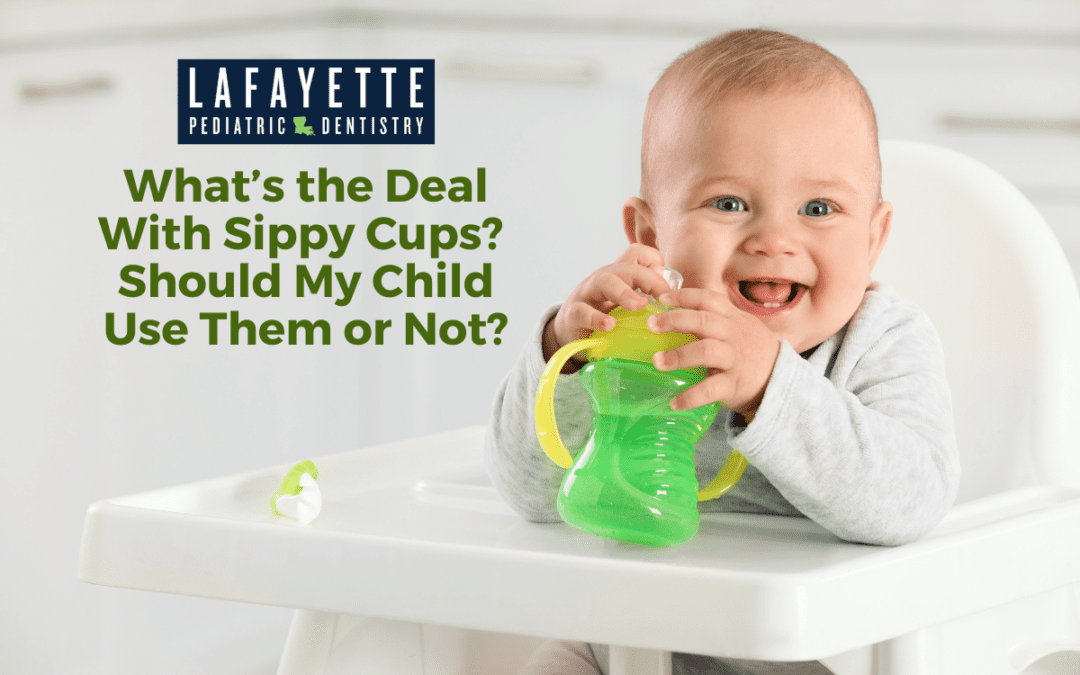As a parent, you probably have numerous questions about introducing sippy cups to your child. When is the right time to introduce one? What should you put in it? Can sippy cups potentially harm your toddler’s oral health?
This article provides answers to these common questions regarding the use of sippy cups. You’ll learn when to introduce one, what to fill it with, and how to minimize any risks as your toddler transitions to this new drinking method. In addition, you’ll find valuable advice to ensure optimal oral health for your child.
Does My Baby Need to Use Sippy Cups?
Sippy cups are often seen as a middle step between bottles/breastfeeding and an open cup for toddlers. But are they necessary? Not necessarily. Many toddlers can transition straight from breastfeeding or bottle-feeding to using an open cup without needing an interim sippy cup stage.
However, for some toddlers and parents, using a sippy cup can smooth the transition process. So, while sippy cups aren’t an essential part of the transition, they can be a helpful stepping stone for some on the path from breast or bottle feeding to an open cup. Ultimately, the choice comes down to each child’s development and parents’ preferences.
When is the Ideal Time to Introduce Sippy Cups to My Baby?
Around 6 months of age, when babies begin eating solid foods, is an ideal time to introduce a sippy cup for drinking. However, parents should not rely on sippy cups for too long. They should only be used temporarily as a learning tool. Encourage your child to fully transition to drinking from an open cup by approximately 2 years old for optimal health.
What Liquids Should Go in My Baby’s Sippy Cup?
When filling your child’s sippy cup, water is the best option. Putting sugary drinks like juice or milk in a sippy cup that your child sips from constantly can promote tooth decay. The sugars coat their teeth in bacteria that erode emerging baby teeth.
As with bottles, do not let your toddler bring anything but water in their sippy cup to bed. Sugary liquids pooling around their teeth overnight can lead to early childhood tooth decay.
Read also: The 5 Most Common Causes of Cavities in Children
What Type of Sippy Cup is Best for Oral Development?
Choose a sippy cup with a short straw to support your child’s oral health. A short straw strengthens tongue muscles and teaches mature swallowing patterns as your little one uses their tongue to suck and swallow. Try to avoid sippy cups with soft or hard spouts, as these mimic bottle-feeding and promote immature swallow patterns, which can delay your child’s oral motor development.
Sippy Cup Advice for Parents
Don’t Drink and Walk
When your toddler is still learning how to walk and is not yet steady on their feet, do not allow them to drink from their cup while walking. This prevents possible mouth injuries from falls. Allowing a young, unsteady toddler to simultaneously try to balance while walking and sip liquid from their cup creates an unsafe situation where they are more likely to trip or fall.
Be Patient When Introducing Sippy Cups to Your Child
It’s also important to be patient and not get frustrated if your toddler initially refuses or protests making the switch from drinking from a bottle to using a sippy cup. They are used to the comfort, feel and function of their bottles, so shifting to a different vessel understandably will take some getting used to.
Additionally, the valves on sippy cups that make them spill-proof also require harder sucking strength, which toddlers are not accustomed to. Expect that they may push the new cup away, drop or throw it, or cry for their bottle instead. Keep calmly offering it during the transition process from bottle to cup. With time and practice, they will eventually accept it.
Protecting Your Child’s Smile for a Lifetime
When used properly during a limited time, sippy cups don’t pose risks to children’s oral health. In fact, the right kinds of sippy cups can support healthy oral development by strengthening the tongue and swallowing muscles.
However, even more important than any drinking vessel is instilling good lifelong dental hygiene habits from the start. Brushing tender young teeth and gums twice daily, flossing daily, visiting a pediatric dentist regularly for checkups, and minimizing sugary foods and drinks are the best protections every parent can provide to their children.
That’s why our pediatric dental team focuses on comprehensive care tailored to little smiles at every stage. Our kid-friendly dental office and caring staff help your child learn and maintain good oral care practices that will benefit them throughout life. We provide education and a positive environment that allows children to build healthy dental habits starting from their first visit.
Request an appointment to bring your child in for their first checkup. We will evaluate their oral development and answer any questions you might have about your child’s dental health. Fill out this online form to book your visit with the best pediatric dentist in the Lafayette area. Our team at Lafayette Pediatric Dentistry looks forward to caring for your child’s beautiful smile!
